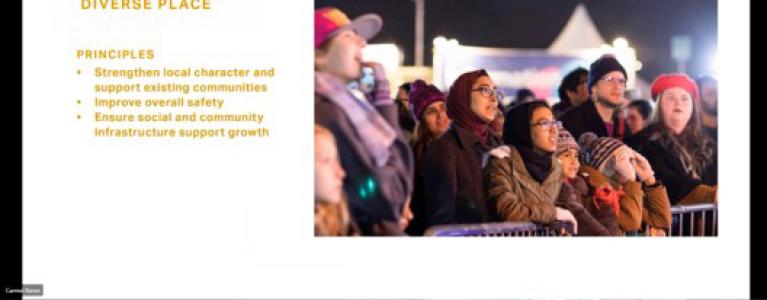
Created on
03 March 2021
Like all planning authorities in this COVID world, the Greater London Authority has sought to find new ways to involve Londoners effectively in the planning process. This has had mixed outcomes, some effective, and some less so.
We thought the start of 2021 might be a great opportunity to reflect on those things that have worked, or not, and explore what our next steps might be and how this might affect the future of consultation in the planning space.
Background
The GLA is a strategic planning authority, however unlike many strategic planning authorities it has a greater role to play in the planning process, both producing and monitoring policy and supporting the Mayor in exercising his statutory planning powers for the consideration of major planning applications.
Traditional Approaches
Traditionally the planning process has sought to engage with the communities it serves in a number of ways, however these can broadly be defined as (i) for the development management process, passively and (ii) in policy consultations often more proactively through face-to-face consultation events, exhibitions, and increasingly through tools such as digital online platforms.
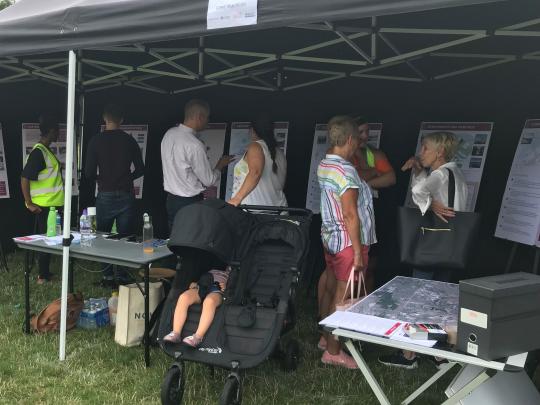
Image: Talking to the community of Thamesmead and Abbey Wood, Global Fusion World Music Day, August 2019
New or Adapted Approaches
At the start of COVID it was unclear how long there were going to be limitations on how we work.
Notwithstanding that, at the GLA we took the view that the planning system was one of the most powerful tools to contribute towards the recovery of London and could not wait for the lifting of lockdown. As such we concluded that we would try to engage and consult communities as effectively as we could in this constrained world.
We want to share some of our experience and learning in this space, to contribute to the debate about how to involve communities in the planning process moving forwards and unlock the challenge of reaching often hard to reach communities.
Online consultation platforms were not a new thing to the GLA’s planning team, however we did have the opportunity to use them both before and during the COVID period. We used Commonplace to consult on Opportunity Area Planning Frameworks (OAPF), and Bang the Table to consult on London Plan Guidance coming forward to support the London Plan.
It would be unfair to comment on the functionality of either here, but we do have some key learnings that apply to both:
- Online platforms alone have not yet managed to achieve the ability to extract comments from residents as effectively as face-to-face consultations.
- In our experience at the strategic level, the conversion rate of visits to consultation platforms to comments is extremely low and an area that we could look to the private sector to learn from.
- What they are good at is providing a comprehensive space for residents and professionals to access and understand information and provide comments in a format that can be easily interrogated and analysed. Sentiment analysis which removed bias by using machine learning is a particular benefit. They also create a permanent record of what was said to enable communities to see how their comments have been taken on board, helping to re-build trust that is missing.
- ‘Build it and they will come’ is not the case. The availability of a consultation platform is only one part of the puzzle. It does not replace any of the hard work of inviting residents to comment on proposals and the real value of face-to-face spontaneous conversation and explanation. Also, reaching underrepresented groups, those digitally excluded, or residents that might find information difficult to comprehend are other challenges not yet met by online platforms.
Please visit our consultation sites hosted by Commonplace: Thamesmead and Abbey Wood Opportunity Area Planning Framework, Royal Docks and Beckton Riverside Opportunity Area Planning Framework.
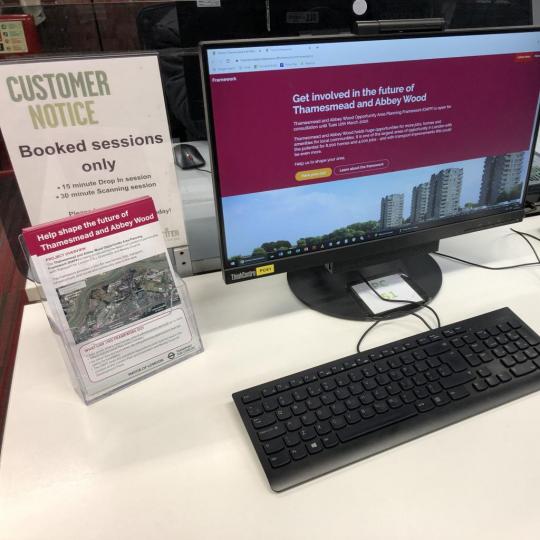
As part of the Mayor’s Civic Innovation Challenge, 3D Repo won the opportunity to work with the GLA to try and unlock the challenge of resident involvement in the planning process through enabling residents to better understand planning proposals thus making it more accessible and relatable.
Whilst still in development as an open source tool, it has enabled residents to look at development proposals in their locality, navigate to view the proposals from different angles, including from their own property and supply comments on schemes.
PlanBase was tested by various audiences including local government representatives, built environment professionals, the Mayor’s youth peer outreach team and volunteers from our Talk London audience. It hasn’t yet been tested in a formal consultation, but already we have some key learnings:
- Residents, whilst liking the flexibility were most interested in seeing schemes and development proposals in the same way as they would experience them in real life, so mainly from street level.
- The tool provided a visual narrative that helped bring the scheme to life making it relevant and easier to identify impacts that may warrant a response. It was noted that it was easier to understand plans (particularly for the disabled community) however 3D was not the complete answer – the tool needs to include visuals and more pop-up details of the proposals to increase understanding.
- Any level of specialist skill or dexterity acts as an exclusion to resident involvement in such a tool, resulting in communities still being excluded from consultations.
- This works well with individual development proposals, however to upscale to more strategic development proposals will take more skills and innovation to represent fully on a visual tool like this.
- This has the potential to start building the link between BIM models and the planning system embedding consultation and input from communities at an early stage to be easily referred to throughout the entire process.
Catch up on a webinar which explains more about the PlanBase tool.
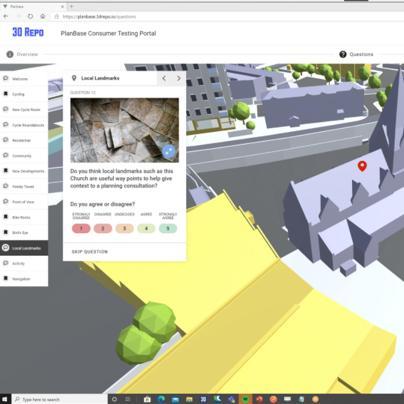
As with the rest of the world, we attempted to relocate our face to face consultation events online. Over the period of five weeks we hosted a series of over 20 events attracting many attendees from both communities and the built environment sector. This created the opportunity for attendees to raise questions and discuss issues.
We had a number of key learnings from these events:
- Whilst the audience was mixed at area-based events, the events held on strategic policy documents tended to lean toward professional planners rather than members of the community.
- People have Zoom fatigue, so the thought of attending events at set times was not attractive.
- For these to be effective more interactivity is required, for example polls during sessions, mixture of speakers and presentation styles.
- Many are catching up after the event - so making recordings available after the event is essential.
- More needs to be done to attract all sectors and members of the community, for them to feel able to attend, included and valued.
It is clear that Londoners may not feel that their voices will be heard or that they are not equipped to take part due to a perceived lack of knowledge. This could explain a lack of local level participation. For instance, for our Royal Docks consultation due to Covid-19 we issued an information leaflet to 70,000 residents and businesses which published details of events – whilst an essential and valid exercise to inform the community, it had limited effectiveness in community participation in events.
UK-wide research recently published by Commonplace asked participants ‘what sort of people take part in the planning process?’ 41% answered local people, with 70% and 49% stating developers and businesses respectively. Residents putting developers and business over their say in the local area is disappointing to hear.
38% of those asked said that they don’t know how to take part in consultations, with perhaps more worryingly 36% knowing how to take part but not feeling they have a say over the outcome. The research demonstrated a lack of transparency, lack of trust and a lack of confidence to engage in the planning process. This should a priority for us all in the industry to change.
As part of our commitment to the work of Public Practice, the planning team participated in a research investigation on Planning with Young People, which reached out to schools to engage students in the planning process.
Over the course of 10 sessions through Public Practice and as part of the Royal Docks OAPF consultations there were a number of areas of learning about consultation in this space that will be core to our future work:
- The planning system doesn’t really cover this ground at the moment. Recent research carried out by Grosvenor stated 89% of young adults they surveyed have never been asked their opinion on the future of their neighbourhood. 82% stated they would like to be involved .
- Feedback received was constructive, thought-provoking and innovative and demonstrated that more engagement with those whose future we are designing for is necessary.
- To engage with students and youth we need find ways to present information and engage with them from their current understanding and interest / view point. We need to be more imaginative and again, make it relevant.
- Whilst the value of some of the outputs of the planning system were well understood (e.g. open space, affordable housing and social cohesion). There was limited understanding that many of these were results of the planning system and how they could be influenced / delivered.
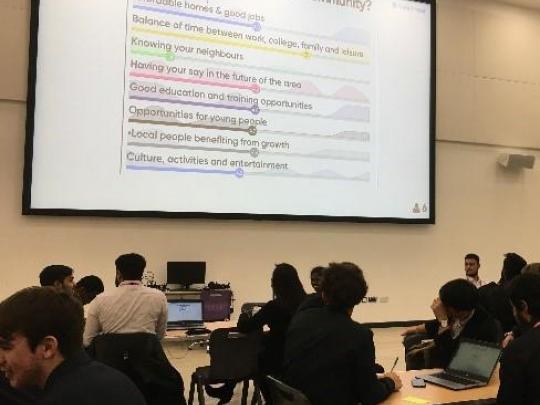
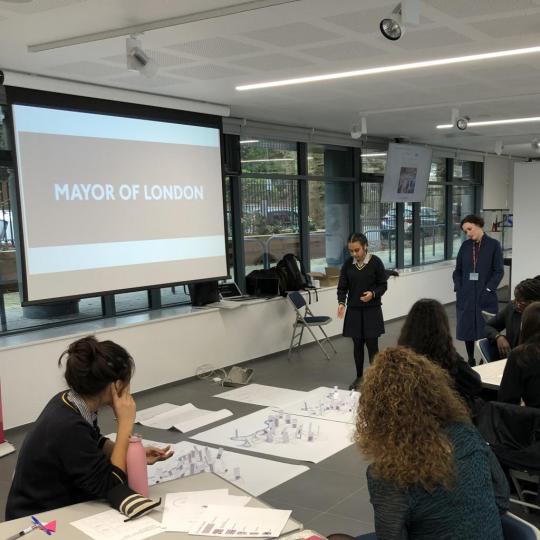
Conclusion
As a planning profession, we have always known deep down that our methods of consultation were not perhaps 100% effective in delivering the key messages, reaching all in the community or fixing low levels of trust. We knew this was reflecting in participation, feedback levels and therefore our place-making. The solutions are complex and it is clear more needs to be done.
Over the last 12 months key and innovative pieces of research have been completed by the private sector including the work by Grosvenor and Commonplace. This has raised key questions:
- Should we as an organisation be taking this further to explore?
- Why are levels of participation in strategic level planning so low, for example just 7% for local plans?
- What do we need to do to improve?
- Why and how do London’s community want us to change?
- What education is needed to break the barriers down for all to know about the process, to feel included in the process and to feel empowered that their thoughts and ideas are being listened to?
The new focus on co-design embedded by the New London Plan provides opportunities for planners to engage with communities in more effective ways. However recent research by the GLA’s regeneration team into capacity of planning authorities might also force many of us to review how we resource it.
It is impressive that we have managed to move all of our engagements online, and create opportunities for more open and transparent consultation, however digital engagement is only part of the challenge, and our future challenge needs to be how we can access and involve less well represented communities in decision making as part of a mix.
The good news is that there is lots we can learn, including digital marketing, to access groups that are active in the digital community such as the youth who are there but are just not yet engaging with the planning system in any number.
The bad news however is that only focussing on a digital world, by its very definition excludes those not in the digital world, those very people who are often already excluded from the planning system.
We are keen to maximise the value of consultation in the digital space but must also recognise its many limitations. Something we hope to challenge and drive moving forwards.
We would value hearing your ideas on how to move this area of work forwards.